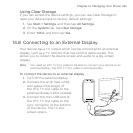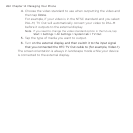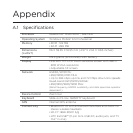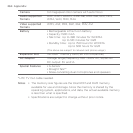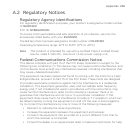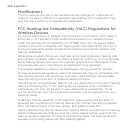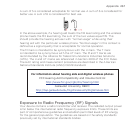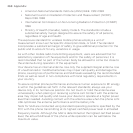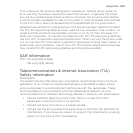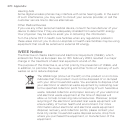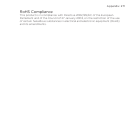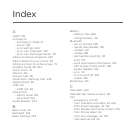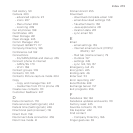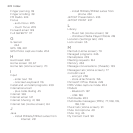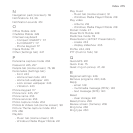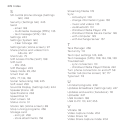Appendix 269
This is because the phone is designed to operate at multiple power levels so
as to use only the power required to reach the network. In general, the closer
you are to a wireless base station antenna, the lower the power output. Before
a phone model is available for sale to the public, it must be tested and certified
to the FCC that it does not exceed the limit established by the government-
adopted requirement for safe exposure. This phone has been tested and meets
the FCC RF exposure guidelines when used with an accessory that contains no
metal and that positions the handset a minimum of 1.5 cm from the body. For
body worn operation, to maintain compliance with FCC RF exposure guidelines,
use only HTC Corporation approved accessories. When carrying the phone while
it is on, use the HTC Corporation supplied or approved carrying case, holster, or
other body-worn accessory. Use of non HTC Corporation approved accessories
may violate FCC RF exposure guidelines and should be avoided.
SAR Information
FCC: 1.16 w/kg @1g (Head)
1.26 w/kg @1g (Body)
Telecommunications & Internet Association (TIA)
Safety Information
Pacemakers
The Health Industry Manufacturers Association recommends that a minimum
separation of six inches be maintained between a handheld wireless phone
and a pacemaker to avoid potential interference with the pacemaker. These
recommendations are consistent with the independent research by and
recommendations of Wireless Technology Research. Persons with pacemakers:
Should ALWAYS keep the phone more than six inches from their
pacemaker when the phone is turned ON.
Should not carry the phone in a breast pocket.
Should use the ear opposite the pacemaker to minimize the potential for
interference. If you have any reason to suspect that interference is taking
place, turn the phone OFF immediately.
•
•
•



